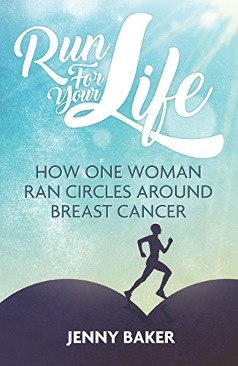Run for Your Life is a delightful, courageous and down-to-earth book about a champion’s discovery and perseverance as a runner, alongside her fight against cancer.
You need resilience as a runner, and running also helps build resilience. Baker discusses her discovery of running as a hobby, her training, her marathons, and her love for local parkruns. Parkruns are free events hosted at 9am in towns all around the world. She affirms the accessible nature of the sport expressed in Parkruns: “where marathon finisher shirts line up next to not-been-worn-since-school plimsolls. It is for people who that Saturday felt they couldn’t go any further, but who a couple of days later find they actually can. No one is too slow. … parkrun is the quiet witness to countless people turning their lives around, where good intentions to exercise first become a reality, where dreams of running a marathon ‘someday’ start to become a possibility.”
She also reflects personally on how running at its best can subvert an obsession with appearance. Resilience expresses itself in physical ways but also emotional ways when we get compared or evaluated by others or society’s arbitrary measures. For Baker, running invites a positive body appreciation based on looking after ourselves and doing our personal best, as she writes: “experiencing my body as strong and capable, rather than something to reduce through diets or put on display.”

Resilience is tested and built in other areas of life too – and cancer is among the scariest of tests of change. Baker had been running regularly for more than a decade, increasing her distances, stretching her limits, and was still achieving Personal Bests as she approached her 50th birthday. Finding a lump in her breast changed everything. In the rush and busyness of appointments, she asked her oncologist if she could run to her first chemotherapy session, knowing how important running was to her mental health. He said he had not been asked that before but did not see why not. Admittedly he was a runner himself, and in between advising her about the side-effects of chemo proceeded to encourage her to consider German marathons and aim for the Berlin marathon next.
The challenge of running to subsequent appointments, albeit shorter and slower, gave her something to aim for. It gave her friends opportunity to join with her in solidarity as they ran with her. It helped her reframe the battle – and to include laughter and friendship alongside the inevitable illness and grief. Running continued to be a tonic of resilience as she faced a mastectomy, reconstruction, radiotherapy and hormone therapy. Baker admits a metaphor can never be perfect, but she queried of her cancer: “Was it an adversary that I was battling against, or a companion that I would journey with for a while?” This helped her on the journey to battle on and find herself again, bringing the unknown into reach.

Along the journey you’ll read about the satisfaction of goal-setting and attainment, the subversiveness of running in Palestine, and the emotional upheaval and grief of cancer symptoms and treatment side-effects. Through it all you’ll be encouraged and inspired by the life-giving sustenance that sport can bring and the support of a community of friends, such as those who ran with Jenny to her regular chemotherapy treatments. Run for Your Life is the story of Jenny Baker’s running and fight with cancer, but it will inspire you to run or whatever else grabs your imagination in life-giving ways too.
Jenny Baker writes my favourite blog about running and you can follow Jenny Baker on Twitter. She invites readers to share their stories of how running has helped overcome adversity on Twitter with the hashtag #Runforyourlife. The book was published in 2017 by Pitch Publishing.
Highly recommended especially for those with a love for running or facing cancer, or both, but with lessons for resilience and leadership through change for other spheres too.
About the Reviewer
Darren Cronshaw is a Chaplain who has served at Army School of Transport, Puckapunyal, 1st Recruit Training Battalion, Kapooka and Defence Force School of Signals. He is also Professor of Practical and Intercultural Theology with the Australian College of Ministries (Sydney College of Divinity). His hobby is pushing the boundaries of resilience in Ironman triathlons.

